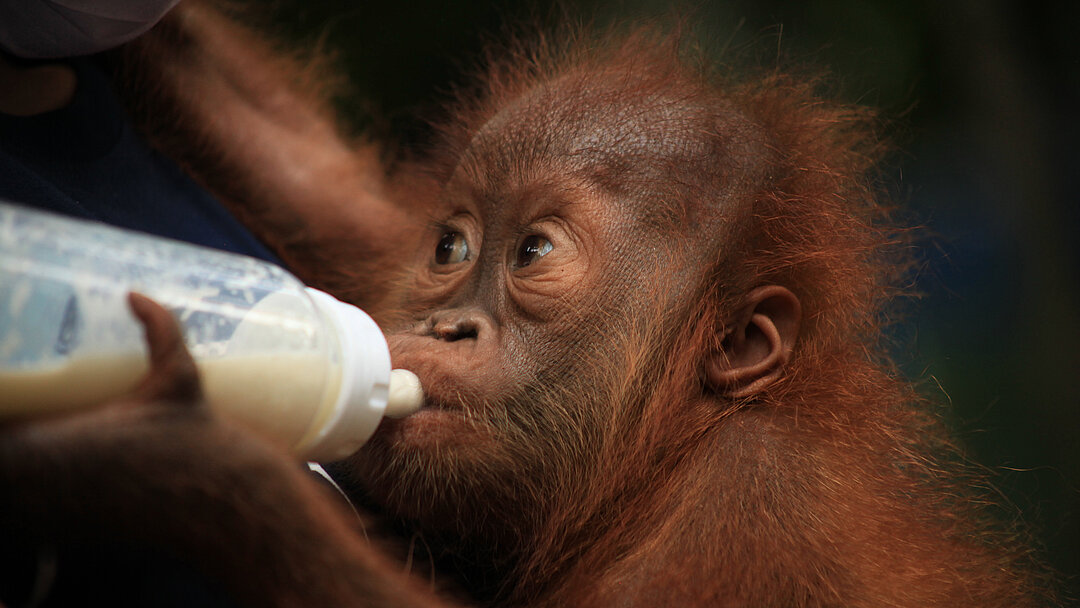
The last large contiguous deep rainforest area of ??Sumatra has been suffering for years due to a sharp decline in forest cover for the native large mammals such as the Sumatran elephants and orangutans. The increase in deforestation and the establishment of oil palm plantations in areas surrounding the national park pose a significant threat to their habitat. The animals often have to leave their safe havens in search of food, encroaching into human settlements, which further exacerbates conflicts between the locals and wild animals.
In 1998, the ZGF launched a conservation project for the reintroduction of orangutans into the wild in order to protect the region's unique ecosystem. The aim of the project is to establish a viable orangutan population in the centre of Sumatra with the help of a team of local project workers who work in close cooperation with the local population to educate and raise awareness about the importance of protecting the rainforest. Orangutan orphans who have been found or rescued from illegal captivity are prepared for release into the wild by training them at the jungle school in the Open Orangutan Sanctuary (OOS).
Thanks to the long-standing support of sponsors such as Hellabrunn Zoo, the programme has since been expanded to become an extensive landscape conservation project. A legacy gift left to the zoo will now see even further expansion of Hellabrunn's cooperation with the ZGF. "The aim of the project at Bukit Tigapuluh has always been the release of Sumatran orangutans into the wild to strengthen the overall population of a species threatened with extinction in Sumatra," explains Julia Knoll, head of species conservation and education at Hellabrunn Zoo. "With this one-off financial contribution, Hellabrunn Zoo is fulfilling the wish of a deceased friend of the zoo to invest in the care of the orangutans in-situ."
The support comes at just the right time: Last April, two orangutan infants, Sudin and Siti, were brought to the reintroduction programme - the youngest so far. Thanks to the intervention of the Indonesian authorities, the two one-and-a-half-year-old babies were able to escape a fate of misery and were handed over to the care of the ZGF team. However, this presented a major challenge for the entire ZGF project team. “ZGF operates two orangutan stations for the reintroduction programme, south and south-east of the national park. Conversion work is now underway so that our colleagues can provide the best care for the two young orangutans," says ZGF programme manager Dr Peter Pratje, who is delighted about the newcomers. The young orangutans are currently being housed in a specially set up infant station at the Sumatra Orangutan Rehabilitation Centre (SORC). "Orphans at such a young age have to be cared for around the clock by skilled carers in the first years of their life in order to compensate for the lack of physical contact with the mother. In addition, the carers have to teach the infants basic behaviours that they would normally learn from their mothers,” adds Pratje. Caring for the orphans in the best possible way requires time and additional staff. Furthermore, the technical infrastructure on site also needs to be upgraded.
In light of the new cooperation, Zoo Director Rasem Baban takes the opportunity to emphasise Hellabrunn Zoo's important role as an educational and nature conservation institution: "As a modern, scientifically-led zoo, we take our duty of raising awareness among visitors about biological diversity and nature conservation very seriously. Our animals in Munich are ambassadors for their species in the wild and we look forward to making a further contribution to their preservation.”
Visitors can learn more about the challenges for nature conservation in the great ape's habitat and the species protection programmes supported by Hellabrunn in the Species Conservation Centre and the Orangutan Hall at the zoo. Visitors can also make a small donation to support the conservation effort via the donation box.